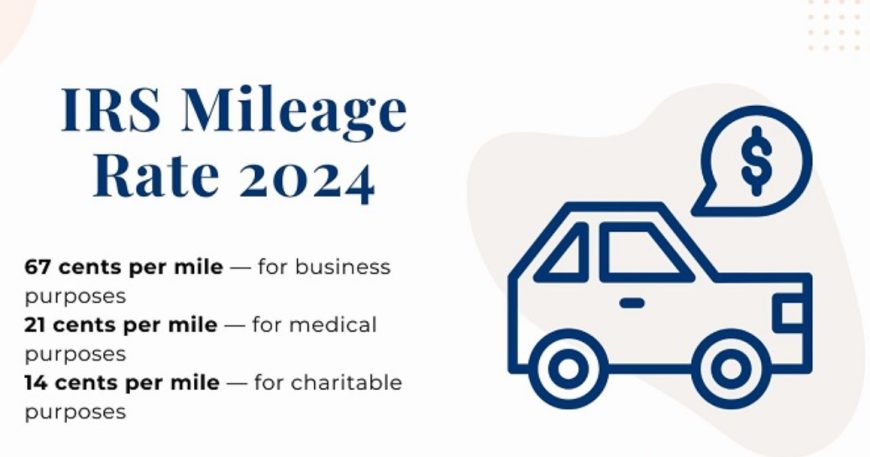For many individuals and businesses in the United States, navigating the ever-changing landscape of travel expenses can be challenging. One crucial factor to consider is the federal mileage reimbursement rate, which significantly claims deductions for business use of your vehicle. This comprehensive guide by Syed Professional Services demystifies the federal mileage rate for 2024, exploring its purpose, applications, and how it can benefit you.
Understanding the Federal Mileage Rate: A Standardized Approach
The Internal Revenue Service (IRS) annually establishes the federal mileage rate to simplify deducting business-related vehicle expenses. This standard rate eliminates the need for taxpayers to track and record all their gasoline and maintenance costs meticulously. The federal mileage rate is a predetermined allowance that reflects the average operational costs per mile driven for business purposes.
The 2024 Federal Mileage Rate: A Slight Increase
For the tax year 2024, the IRS has increased the standard mileage rate to 67 cents per mile. It represents a 1.5-cent increase from the 2023 rate of 65.5 cents per mile. This adjustment accounts for fluctuating gas prices and overall vehicle operating expenses.
Who Can Utilize the Federal Mileage Rate?
The federal mileage rate is beneficial for a variety of taxpayers, including:
- Employees: If you use your vehicle with your employer’s permission for business, you can claim the mileage deduction using the federal rate.
- Self-Employed Individuals: Business owners and independent contractors can deduct business mileage using the federal rate to reduce their taxable income.
- Independent Professionals: Freelancers, consultants, and other independent professionals can leverage the federal mileage rate to claim deductions for business-related vehicle use.
Qualifying for the Mileage Deduction: Understanding Business Use
Your business-related vehicle use needs to fulfill the “ordinary and necessary” criteria to obtain a mileage reduction at the nationwide rate. To determine whether the deduction is applicable, refer to the following business mileage examples:
- Traveling to and from client meetings
- Running errands for business purposes, such as picking up supplies
- Driving to and from temporary work locations
- Delivering goods or services to clients
The Mileage Deduction: Standard Mileage Rate vs. Actual Cost Method
The federal mileage rate offers a convenient and straightforward method for claiming vehicle expense deductions. However, you also have the option of using the actual cost method. This method involves meticulously tracking all car-related expenses, including gasoline, repairs, maintenance, insurance, and depreciation. While potentially offering a higher deduction in certain situations, the actual cost method requires more detailed record-keeping and calculations.
Choosing the Right Method: Standard Mileage vs. Actual Cost
Here are some factors to consider when deciding between the standard mileage rate and the actual cost method:
- Mileage Driven: If you drive significant miles for business purposes, the standard mileage rate might be more beneficial, even if your actual expenses are lower.
- Record-Keeping: If you’re uncomfortable with meticulous record-keeping, the standard mileage rate offers a more straightforward approach.
- Vehicle Expenses: If your actual vehicle expenses are significantly lower than the standard mileage rate, the actual cost method might be advantageous.
Syed Professional Services: Your Trusted Partner in Tax & Accounting
At Syed Professional Services, we understand the complexities of tax deductions, including those related to business mileage. Our team of tax professionals can guide you through choosing the most advantageous method for your specific situation. We can help you:
- Calculate your mileage deduction using the federal rate.
- Determine if the standard mileage rate or actual cost method is more beneficial for you.
- Ensure your tax return accurately reflects your business mileage deductions.
Maximizing Your Business Mileage Deduction: Record-Keeping Tips
Even if you’re using the standard mileage rate, it’s still essential to maintain some basic records for the IRS:
- Total Miles Driven for Business: Keep track of the miles you drive for business purposes throughout the year.
- Log of Business Trips: Maintain a simple log that documents the date, destination, purpose, and mileage for each business trip.
- Receipts for Major Expenses: While not required for the standard mileage rate, it’s advisable to keep receipts for significant car-related expenses like major repairs.
Conclusion: Mastering the Mileage Deduction with Confidence
Understanding the federal mileage rate and its applications empowers you to claim legitimate deductions for business-related vehicle use. By familiarizing yourself with the basics and seeking guidance from professionals like Syed Professional Services, you can navigate tax season with confidence and potentially reduce your




